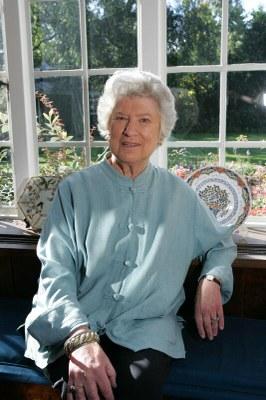In Memoriam Zara Steiner (1928-2020)

Zara Steiner — pioneering historian and devoted teacher
Zara Steiner (1928-2020)
“An American, a woman and a Jew writing about the Foreign Office. It should not be allowed.” Sir Owen O’Malley’s opening remarks hardly sounded encouraging. But Zara persisted with the interview – and with the relationship. O’Malley became one of her closest FO confidants and a good friend, who bequeathed her several boxes of his papers.
That story – the prejudices, the persistence and the outcome – encapsulates the saga of Zara Steiner as a historian. She was also a devoted teacher, warmly appreciated by several decades of Cambridge students. Zara died on 13 February 2020, ten days after her husband, George.
Zara Steiner (née Shakow) grew up in New York. She got ‘hooked’ (her word) on the First World War as a student at Oxford, when she took A.J.P. Taylor’s Special Subject on ‘The Policy of the Ententes’. His main source was the printed volumes of official documents produced after 1918 by the British Government. These revealed the final policy decisions but not how they had been reached. What intrigued Zara were asides in the printed volumes to ‘minutes’ and memoranda by officials. Digging them out became the obsession of her PhD research.
The eventual result was The Foreign Office and Foreign Policy, 1898-1914 (1969). This was cutting-edge stuff for its time, bypassing the normal rules of government declassification and shedding novel light on the culture of the pre-war Foreign Office. She was therefore the ideal choice to write the British volume in Macmillan’s multinational series about the road to 1914. Some material in Britain and the Origins of the First World War (1977) grew out of her earlier book but the analysis of domestic affairs took Zara into new terrain as she mapped the economic, social and cultural influences on policymakers and also assessed the impact of ‘public opinion’. Such an approach is now axiomatic, but Zara was again a pioneer. The volume became a standard textbook; an updated edition appeared in 2003.
In 1976 she was invited to write the successor to Taylor’s classic, The Struggle for Mastery of Europe, 1848-1918. OUP’s brief was 1919-45 in a single volume, for which Zara requested ten years. In a dénouement that will be familiar to many scholars, one volume became two and ten years turned into thirty. The Lights That Failed: European International History, 1919-1933 was published in 2005, and The Triumph of the Dark: European International History, 1933-1939 appeared in 2010.
Each volume provides superb overviews of phases and topics: for example, a masterly sixty-page distillation of post-1918 reconstruction in Eastern and Central Europe. But in tandem the two books also trace a vast narrative arc, and one verging on classical tragedy. Zara did justice to the 1920s as a time of hope, rather than treating it as part of a dark valley between two world wars. She also exposed the damage wrought by the Depression during what she called the ‘hinge years of 1929-33. And yet Europe’s descent into the abyss was not inevitable. Rejecting economic determinism, she showed how the road to war in 1939 was paved with choices, gambles and bungles, played out in global interactions. The magnum opus earned her election as a Fellow of the British Academy in 2007, and won praise from a wide range of reviewers.
Many readers of the Newsletter will remember her dedicated teaching – supportive but also demanding. She was a teaching Fellow of New Hall for thirty years from 1965, serving as Acting President in 1995-6. Zara was particularly close to her doctoral students, caring about them personally as well as intellectually. Many got drawn into the domestic round at 32 Barrow Road, not least in dog-sitting and helping with IT nightmares.
Zara Steiner was in many ways a product of the post-war era – an American settled in Britain who moved easily to and fro across the Atlantic and who believed in the steady advance of Enlightenment rationality. But as the years lengthened, she and George became ever more conscious of their identity and vulnerability as Jews. The upsurge of populist nationalism in the era of Trump, Putin, Orbán and Johnson was deeply unsettling. And the revival of aggressive anti-semitism seemed an existential threat.
Zara’s two volumes therefore stand as both monument and warning. In her final years she saw the lights beginning to fail. Her hope was that this did not signal another triumph of the dark.
By David Reynolds, Emeritus Professor of International History. This is a condensed version of a longer essay accompanied by a series of remembrances by Zara’s former students. The full version can viewed here.
